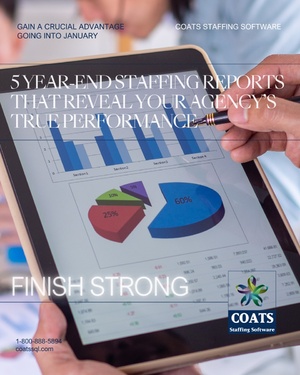Pick the financial partner who is most likely to help you grow, your way.
The economy is finally starting to turn. After almost three years in a slump, the staffing industry is in a turnaround. Your clients need more temporary employees. Your employees are working more. Your payroll and billings are up. Nothing can stop you now. Unless, your financial partner isn’t on board. As we watch our industry rebound (finally), many staffing companies will experience a new problem. They may find that their growth is stifled because they did not partner with a funding source that was right for them. There are a number of funding options available to your company. There is no wrong one. There is, however, a right one for you. Funding is no different from any other service your business might use. You want a partner who knows your business and who has the depth and experience to service your business the way you expect.
Most funding sources fit within one of three categories – banks, factorers and specialty funders. Each of these types of lenders is very different. They each look at your business and the staffing industry differently and each has business practices that can be an advantage to some firms and a detriment to others.
Banks
Banks can be a great place to start your funding search, especially if you have a long standing relationship with a local or regional bank. The key here is that while the bank may not know the staffing industry, they will at least know you.
It’s this relationship and the bank’s knowledge of your business, credit history and commercial and personal accounts that can make the seemingly onerous bank credit approval process more streamlined and easier to tolerate.
Traditionally, banks prefer to lend against hard assets – buildings, cars, manufacturing facilities, etc. While they do it, banks see Accounts Receivable financing as risky. So, a bank, especially one that does not know you, will need to review audited financials, your management team, your business procedures and practices, and your clients, as well as your personal financial strength (as the bank will most likely ask for a personal guarantee).
Once approved by the bank’s Credit Committee, your bank will provide you with a line of credit up to a given amount. You can usually use that line to finance up to eighty percent of your receivables, up to the credit limit.
Once you hit that credit limit, you’ll need to go through the approval process again before the bank can increase your line. The key is to know exactly how large a line you will need. If you have too large a line, you may have to pay fees on the unused portion of the credit line. If your line is too small, you will have to go through the approval process again and pay the associated fees. If your line is the perfect fit for your agency, you’ll benefit from some of the lowest money costs available. While these low rates are often coupled with a variety of monthly service fees (often for positive pay and lock box services) as well as line usage fees, the total cost of borrowing from a bank is usually lower than any other sources.
Large, established, staffing agencies with stable books of business, that are not expecting rapid growth, are ideal candidates for bank financing. Since the rates are usually substantially lower than other sources, a large firm can dramatically cut it’s funding costs if it is willing to accept full recourse on the loan and able to easily operate within the constraints of the line of credit.
If you are a small or rapidly growing staffing firm or you don’t have a solid working relationship with a local bank, you may want to consider the other funding options that are available to you.
Factoring Companies
If you are concerned about the time it may take to underwrite your company, the underwriting process, the amount of money you may have access to or how quickly you’ll have access to it, Factoring Companies may be a good alternative for your firm. Factoring companies are generalists. They will loan money against almost anyone’s receivables, often with no recourse back to your firm. The key here is that factoring companies trade reviewing you with reviewing your clients. Using strict credit underwriting guidelines, factorers will rate the credit quality of each invoice, choosing which ones to accept. They may even provide up to 100% advance rates (less the factoring fee) for those invoices they accept, however there may be invoices that they refuse to fund.
Once they fund it, the factoring company owns that invoice and they act accordingly. Unlike banks and specialty funders, factorers will not be transparent to your clients. Invoices and notices will feature the factoring company’s information, not yours, and, in many cases, factorers will use aggressive collections policies to collect open invoices. Since there is often no recourse back to your firm, some factorers go to great lengths to ensure that they can collect.
Generally speaking, factoring companies are the most expensive funding sources available. Factoring fees are usually higher than those charged by banks and funding companies and factorers will often charge additional fees for credit checks, reports and additional invoices. But with that increased cost, you gain almost immediate access to possibly limitless funds. Factoring companies fund quickly, often with no credit limits.
Specialty Funding Companies
The key to specialty funding companies is that they specialize in the staffing industry. They know the industry, understand its volatility and have developed systems that allow them to support staffing firms like yours. With that said, that does not necessarily mean that they are the best option for your firm. Looking at them as an institution, specialty funders fit between factorers and banks. Like banks, specialty funders will want to underwrite your company. Though the process is considerably less onerous than a bank’s, the funder may ask to see audited financials, invoice aging reports and personal financial statements and may also run credit checks on you, the company’s principals, and your top clients.
Like factorers, specialty funders offer unlimited credit limits and up to 100% advance rates but at significantly lower costs. Unlike factorers, specialty funders are willing to fund all your invoices and choose to remain transparent in the invoice and collection process, placing your company name on the invoices and avoiding aggressive collection techniques.
Go with depth and experience.
The three funding sources all offer some type of trade off. On one side of the spectrum, you find banks with very low costs and strong relationships (if you use a local bank) but tight credit standards and credit line inflexibility. On other end, you find factoring companies who, for a higher cost, offer streamlined approvals, but with no expertise in your industry and no strong business relationships.
Between them, you find specialty funders. More expensive than banks but less expensive than factorers, they may not feature the speed of factorers but they certainly offer more flexibility than banks and bring an industry expertise and the potential for a business relationship that banks and factorers can’t offer.
Regardless of what source you choose, you want to be sure to choose a partner with the experience and financial stability to support your company through good times and bad. This is especially true for factoring and funding companies. When looking at potential financial partners keep these things in mind:
- Experience. You’ll take an enormous risk if you bet your business on a start-up. Make sure your partner has been around long enough to understand the staffing industry’s volatility and has proven itself within the industry. Basically, look for someone who has seen the good and the bad times and knows how to help you through each.
- Deep Pockets. Small funding and factoring companies often run into the same problem with their banks as you could with yours. If you’re going through rapid growth, you know that a bank may not be able to accommodate that growth. Small funding and factoring companies that rely on bank lines often face the same issue. Be sure to ask your financial partner if they have the financial depth to support your growth.
- Accuracy & Service. Funding and factoring companies often invoice and collect in your name. Pick one with a proven reputation for accuracy and service. Poor service from your financial partner can reflect badly on you.
When choosing a financial partner, there is no right answer. Ideally, you want a partner that can offer the package of services, expertise and costs that best meets the goals of your firm. The key is to know exactly what your goals are and how you expect your financial partner to help you accomplish them.





